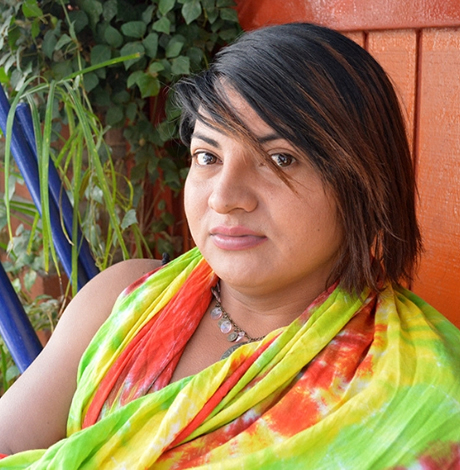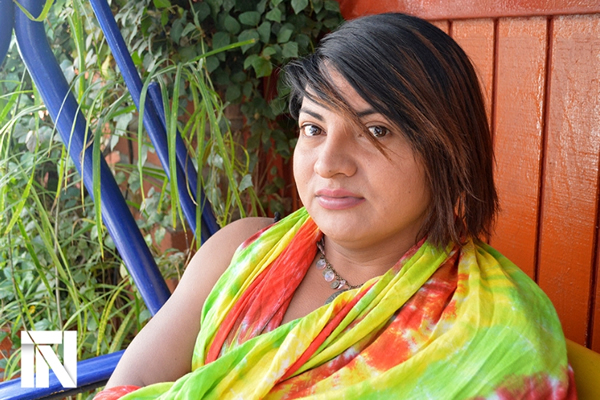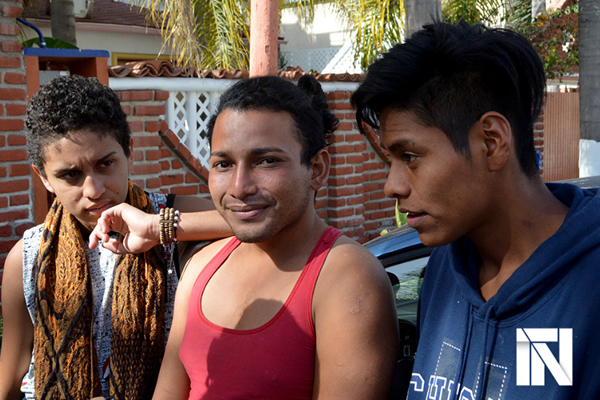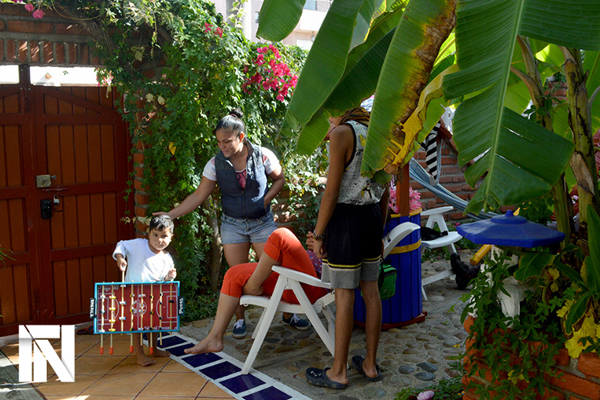News
Migrantes LGBTI+ llegaron a la frontera de EEUU
Grupo de casi 80 personas están en Tijuana


Dentro de poco se cumplirá un mes desde que Loly Méndez salió de El Salvador. (Foto por Yariel Valdés González/Tremenda Nota)
Nota del editor: Yariel Valdés es reportero de Tremenda Nota, una revista electrónica independiente en Cuba que reporta sobre la comunidad LGBT y otros grupos minoritarios en el país. Tremenda Nota es la pareja de contenido del Washington Blade en Cuba.
Yariel Valdés está actualmente en Tijuana, México. Su nota salió originalmente en el sitio web de Tremenda Nota el martes.
TIJUANA, México — Un grupo de migrantes LGBTI+ espera en Tijuana, México, para alcanzar la frontera estadounidense. Decenas de personas dejaron la caravana de al menos 5.000 centroamericanos para evitar el acoso de sus propios compañeros de viaje.
Hace más de 22 días, Loly Méndez emprendió el viaje más largo de su vida. Cerca de 4.400 kilómetros separan por tierra a El Salvador de Estados Unidos. Aun así, Loly decidió unirse a uno de los grupos de migrantes centroamericanos que huyen de la violencia en sus países natales, y avanzan hacia la frontera de Estados Unidos.
Loly, mujer transgénero, cosmetóloga, no vio solo la meta del “sueño americano,” sino la oportunidad de huir de la violencia y la transfobia. Una pandilla la había asaltado y robado en su propio país.
“Doy gracias a Dios porque no me quitaron la vida, ni me violaron,” dice.
En su adolescencia, Loly ya sabía que era una mujer. Sin embargo, el clima de intolerancia que vive en su país de origen le impidió completar el cambio de imagen que deseaba.
“Nunca sabes si vas a amanecer (viva) — dice —. Yo no dejo de pensar en mi amiga, cómo la asesinaron, la estrangularon y la tiraron de un puente. Teníamos planes de salir de allá juntas (de El Salvador), pero la gente le puso odio porque ella ya lucía como una mujer.”
Cruz Torres, director de Diversidad Sexual de la Secretaría de Inclusión Social de El Salvador, estima que 600 personas LGBTI+ han sido asesinadas en los últimos 24 años en ese país centroamericano. Al menos 145 de los crímenes ocurrieron en solo tres años, desde 2015 a 2017.
La frontera, a un paso
“Todas las personas homosexuales que viajamos en esta caravana venimos con el propósito de ser libres, de trabajar, de no ser delincuentes,” explica Loly a Tremenda Nota. “Yo jamás me he prostituido y no voy a otro país a eso.”
La salvadoreña llegó a la localidad Playas de Tijuana el pasado domingo como parte de una avanzada de casi 80 personas de la comunidad LGBTI+, integrantes de la primera caravana de más de 5.000 migrantes centroamericanos.
El grupo llegó escoltado por oficiales del Instituto Nacional de Migración de México y por observadores de varias comisiones de derechos humanos del país azteca. Arribaron a la ciudad fronteriza después de pasar por San Luis Río Colorado (Sonora) y Mexicali, la capital del estado de Baja California.
César Mejías, uno de los migrantes y portavoz no oficial del grupo, declaró que esta primera caravana alcanzó el norte de México antes de lo previsto porque recibieron apoyo de “una organización de Estados Unidos, que también pertenece a la comunidad LGBTI+.” Mejías prefirió no mencionar el nombre de sus patrocinadores.
En Tijuana aumentó la incertidumbre de los migrantes. “Duele saber que ahora nos vayan a deportar para nuestros países,” comenta Kecha Cataleya, una transgénero hondureña de 24 años.
“En 2015 me aventaron gas y me prendieron fuego, aún se me miran las marcas,” cuenta. La joven también asegura que las maras (pandillas) obligan a las personas trans a vender drogas y prostituirse.
Según la organización no gubernamental Transgender Europe, Latinoamérica tiene las tasas mundiales más altas de violencia contra la comunidad LGBTI+.
El Salvador, por ejemplo, ha registrado “aterradores crímenes de odio hacia las personas LGBTI” en los últimos años, según un reporte del grupo COMCAVIS Trans (Comunicacndo y Capacitando a Mujeres Trans). Se trata de “actos que se producen con mayor crueldad de lo usual: mutilaciones, excesos de violencia llegando al extremo de múltiples disparos, cuerpos atados, desmembramiento de partes genitales y acciones de tortura sistemática.”
Cuando Kecha Cataleya y sus compañeros llegaron a la calle Olas Altas, en la sección Coronado, varios vecinos protestaron. “Gracias a Dios — cuenta César Mejías — ellos ya comprendieron quiénes somos, qué es lo que vamos a hacer y cuánto tiempo vamos a estar aquí.”
Mejías y el resto del grupo, en el cual viajan varios menores de edad, esperan por sus “apoderados legales” para iniciar el proceso de asilo político en los Estados Unidos. “Queremos hacer las cosas bien,” añadió.

La caravana LGBTI+ arribó el pasado domingo 11 de noviembre a Tijuana, México. (Foto de Yariel Valdés González/Tremenda Nota)
Sin embargo, el presidente norteamericano Donald Trump ha intentado cerrar todas las puertas de Estados Unidos a los migrantes centroamericanos. El pasado 9 de noviembre el mandatario firmó una orden ejecutiva que prohíbe la entrada al país de forma ilegal por la frontera con México. Si los migrantes centroamericanos accedieran a la nación del norte a través puntos de entrada no autorizados, serían arrestados y perderían el derecho de permanecer en el país o solicitar asilo.
A finales de octubre el gobierno norteamericano anunció el despliegue de 5.200 militares en la frontera con México. Aunque Trump no mostró ninguna prueba aseguró en la red social Twitter que las caravanas “también están formadas por algunos matones y pandilleros muy malos.” En otro de sus tweets amenazó a los migrantes: “¡Esta es una invasión de nuestro país y nuestro ejército te está esperando!”
Unos son más iguales que otros
Durante el trayecto, los integrantes LGBTI+ de la caravana caminaron a la par de sus compatriotas hondureños, salvadoreños y guatemaltecos. Cruzaron a nado los mismos ríos, atravesaron las mismas cercas fronterizas, durmieron bajo la intemperie común, padecieron el mismo frío y la misma hambre. Sin embargo, su condición de personas LGBTI+ provocó que fueran discriminados por sus propios compañeros.
“No me esperaba eso de ellos porque todos somos migrantes y veníamos juntos. Pensé que teníamos que apoyarnos,” denunció la salvadoreña Noe Alvarenga.
“Como somos la comunidad más vulnerable — acota Loly — hemos sufrido la violencia, el machismo que viene dentro de esa caravana. Hemos sido mal vistos, nos gritan cosas.”
La antropóloga social Marta García Ortega, investigadora del Colegio de la Frontera Sur de México, coincide en que dentro del conjunto de migrantes, la comunidad LGBTI+ es particularmente vulnerable, “porque no solo están solicitando un derecho al asilo, también están en mayor riesgo, y requieren atención especial, como las mujeres.”

Varios niños se cuentan en la caravana que alcanzó la localidad Playas de Tijuana, a orillas de la frontera norteamericana. (Foto de Yariel Valdés González/Tremenda Nota)
En efecto, la discriminación, la homofobia, la violencia y los crímenes de odio lanzaron a Loly Méndez, Kecha Cataleya, Noe Alvarenga y César Mejías a un camino de miles de kilómetros, desde sus países natales hasta la frontera norteamericana.
“Vivir como yo deseo vivir, siendo lo que soy, sin que nadie me discrimine, sin necesidad de ocultarme, sin que vengan unos maleantes a la vuelta de la esquina y me golpeen…Eso es lo que quiero,” confiesa Mejías.
El recorrido, sin embargo, no termina en la frontera estadounidense. Ahí deberán emprender otra “caminata” por el sistema legal norteamericano.
Las caravanas que en pocos días tocarán las puertas de Estados Unidos han inaugurado un proceso sin precedentes en la historia reciente de las migraciones forzadas, cree la investigadora Marta García Ortega. “Esto ya no es solo un movimiento de éxodo, es un movimiento por los derechos sociales, por los derechos civiles, por el derecho a migrar.”
District of Columbia
Judge rescinds order against activist in Capital Pride lawsuit
Darren Pasha accused of stalking organization staff, board members, volunteers

A D.C. Superior Court judge on Feb.18 agreed to rescind his earlier ruling declaring local gay activist Darren Pasha in default for failing to attend a virtual court hearing regarding an anti-stalking lawsuit brought against him by the Capital Pride Alliance, the group that organizes D.C.’s annual Pride events.
The Capital Pride lawsuit, initially filed on Oct. 27, 2025, accuses Pasha of engaging in a year-long “course of conduct” of “harassment, intimidation, threats, manipulation, and coercive behavior” targeting Capital Pride staff, board members, and volunteers.
In his own court filings without retaining an attorney, Pasha has strongly denied the stalking related allegations against him, saying “no credible or admissible evidence has been provided” to show he engaged in any wrongdoing.
Judge Robert D. Okum nevertheless on Feb. 6 approved a temporary stay-away order requiring Pasha to stay at least 100 feet away from Capital Pride’s staff, volunteers, and board members until the time of a follow-up court hearing scheduled for April 17. He reduced the stay-away distance from 200 yards as requested by Capital Pride.
In his two-page order issued on Feb. 18, Okun stated that Pasha explained that he was involved in a scooter accident in which he was injured and his phone was damaged, preventing him from joining the Feb. 6 court hearing.
“Therefore, the court finds there is a good cause for vacating the default,” Okun states in his order.
At the time he initially approved the default order at the Feb. 6 hearing that Pasha didn’t attend, Okun scheduled an April 17 ex parte proof hearing in which Capital Pride could have requested a ruling in its favor seeking a permanent anti-stalking order against Pasha.
In his Feb. 18 ruling rescinding the default order Okun changed the April 17 ex parte proof hearing to an initial scheduling conference hearing in which a decision on the outcome of the case is not likely to happen.
In addition, he agreed to consider Pasha’s call for a jury trial and gave Capital Pride 14 days to contest that request. The Capital Pride lawsuit initially called for a non-jury trial by judge.
One request by Pasha that Okum denied was a call for him to order Capital Pride to stop its staff or volunteers from posting information about the lawsuit on social media. Pasha has said the D.C.-based online blog called DC Homos, which Pasha claims is operated by someone associated with Capital Pride, has been posting articles portraying him in a negative light and subjecting him to highly negative publicity.
“The defendant has not set forth a sufficient basis for the court to restrict the plaintiff’s social media postings, and the court therefore will deny the defendant’s request in his social media praecipe,” Okun states in his order.
A praecipe is a formal written document requesting action by a court.
Pasha called the order a positive development in his favor. He said he plans to file another motion with more information about what he calls the unfair and defamatory reports about him related to the lawsuit by DC Homos, with a call for the judge to reverse his decision not to order Capital Pride to stop social media postings about the lawsuit.
Pasha points to a video interview on the LGBTQ Team Rayceen broadcast, a link to which he sent to the Washington Blade, in which DC Homos operator Jose Romero acknowledged his association with Capital Pride Alliance.
Capital Pride Executive Director Ryan Bos didn’t immediately respond to a message from the Blade asking whether Romero was a volunteer or employee with Capital Pride.
Pasha also said he believes the latest order has the effect of rescinding the temporary stay away order against him approved by Okun in his earlier ruling, even though Okun makes no mention of the stay away order in his latest ruling. Capital Pride attorney Nick Harrison told the Blade the stay away order “remains in full force and effect.”
Harrison said Capital Pride has no further comment on the lawsuit.
District of Columbia
Trans activists arrested outside HHS headquarters in D.C.
Protesters demonstrated directive against gender-affirming care

Authorities on Tuesday arrested 24 activists outside the U.S. Department of Health and Human Services headquarters in D.C.
The Gender Liberation Movement, a national organization that uses direct action, media engagement, and policy advocacy to defend bodily autonomy and self-determination, organized the protest in which more than 50 activists participated. Organizers said the action was a response to changes in federal policy mandated by Executive Order 14187, titled “Protecting Children from Chemical and Surgical Mutilation.”
The order directs federal agencies and programs to work toward “significantly limiting youth access to gender-affirming care nationwide,” according to KFF, a nonpartisan, nonprofit organization that provides independent, fact-based information on national health issues. The executive order also includes claims about gender-affirming care and transgender youth that critics have described as misinformation.
Members of ACT UP NY and ACT UP Pittsburgh also participated in the demonstration, which took place on the final day of the public comment period for proposed federal rules that would restrict access to gender-affirming care.
Demonstrators blocked the building’s main entrance, holding a banner reading “HANDS OFF OUR ‘MONES,” while chanting, “HHS—RFK—TRANS YOUTH ARE NO DEBATE” and “NO HATE—NO FEAR—TRANS YOUTH ARE WELCOME HERE.”
“We want trans youth and their loving families to know that we see them, we cherish them, and we won’t let these attacks go on without a fight,” said GLM co-founder Raquel Willis. “We also want all Americans to understand that Trump, RFK, and their HHS won’t stop at trying to block care for trans youth — they’re coming for trans adults, for those who need treatment from insulin to SSRIs, and all those already failed by a broken health insurance system.”
“It is shameful and intentional that this administration is pitting communities against one another by weaponizing Medicaid funding to strip care from trans youth. This has nothing to do with protecting health and everything to do with political distraction,” added GLM co-founder Eliel Cruz. “They are targeting young people to deflect from their failure to deliver for working families across the country. Instead of restricting care, we should be expanding it. Healthcare is a human right, and it must be accessible to every person — without cost or exception.”

Despite HHS’s efforts to restrict gender-affirming care for trans youth, major medical associations — including the American Medical Association, the American Academy of Pediatrics, and the Endocrine Society — continue to regard such care as evidence-based treatment. Gender-affirming care can include psychotherapy, social support, and, when clinically appropriate, puberty blockers and hormone therapy.
The protest comes amid broader shifts in access to care nationwide.
NYU Langone Health recently announced it will stop providing transition-related medical care to minors and will no longer accept new patients into its Transgender Youth Health Program following President Donald Trump’s January 2025 executive order targeting trans healthcare.
Ecuador
Justicia reconoce delito de odio en caso de bullying en Instituto Nacional Mejía de Ecuador
Johana B se suicidó el 11 de abril de 2023

A casi tres años del suicidio de Johana B., quien estudió en el Instituto Nacional Mejía, colegio emblemático de Quito, el Tribunal de la Corte Nacional de Justicia ratificó la condena para el alumno responsable del acoso escolar que la llevó a quitarse la vida.
Según información de la Fiscalía, el fallo de última instancia deja en firme la condena de cuatro años de internamiento en un centro para adolescentes infractores, en una audiencia de casación pedida por la defensa del agresor, tres meses antes de que prescriba el caso.
Con la sentencia, este caso es uno de los primeros en el país en reconocer actos de odio por violencia de género, delito tipificado en el artículo 177 del Código Orgánico Penal Integral (COIP).
El suicidio de Johana B. ocurrió el 11 abril de 2023 y fue consecuencia del acoso escolar por estereotipos de género que enfrentó la estudiante por parte de su agresor, quien constantemente la insultaba y agredía por su forma de vestir, llevar el cabello corto o practicar actividades que hace años se consideraban exclusivamente para hombres, como ser mando de la Banda de Paz en el Instituto Nacional Mejía.
Desde la muerte de Johana, su familia buscaba justicia. Su padre, José, en una entrevista concedida a edición cientonce para la investigación periodística Los suicidios que quedan en el clóset a causa de la omisión estatal afirmó que su hija era acosada por su compañero y otres estudiantes con apodos como “marimacha”, lo que también fue corroborado en los testimonios recogidos por la Unidad de Justicia Juvenil No. 4 de la Fiscalía.
Los resultados de la autopsia psicológica y del examen antropológico realizados tras la muerte de Johana confirmaron las versiones de sus compañeras y docentes: que su agresor la acosó de manera sistemática durante dos años. Los empujones, jalones de cabello o burlas, incluso por su situación económica, eran constantes en el aula de clase.
La violencia que recibió Johana escaló cuando su compañero le dio un codazo en la espalda ocasionándole una lesión que le imposibilitó caminar y asistir a clases.
Días después del hecho, la adolescente se quitó la vida en su casa, tras escuchar que la madre del agresor se negó a pagar la mitad del valor de una tomografía para determinar la lesión en su espalda, tal como lo había acordado previamente con sus padres y frente al personal del DECE (Departamento de Consejería Estudiantil del colegio), según versiones de su familia y la Fiscalía.
#AFONDO | Johana se suicidó el 11 de abril de 2023, tras ser víctima de acoso escolar por no cumplir con estereotipos femeninos 😢.
Dos semanas antes, uno de sus compañeros le dio un codazo en la espalda, ocasionándole una lesión que le imposibilitó caminar 🧵 pic.twitter.com/bXKUs9YYOm
— EdicionCientonce (@EdCientonce) September 3, 2025
“Era una chica linda, fuerte, alegre. Siempre nos llevamos muy bien, hemos compartido todo. Nos dejó muchos recuerdos y todos nos sentimos tristes; siempre estamos pensando en ella. Es un vacío tan grande aquí, en este lugar”, expresó José a Edición Cientonce el año pasado.
Para la fiscal del caso y de la Unidad de Justicia Juvenil de la Fiscalía, Martha Reino, el suicidio de la adolescente fue un agravante que se contempló durante la audiencia de juzgamiento de marzo de 2024, según explicó a este medio el año pasado. Desde entonces, la familia del agresor presentó un recurso de casación en la Corte Nacional de Justicia, que provocó la dilatación del proceso.
En el fallo de última instancia, el Tribunal también dispuso que el agresor pague $3.000 a la familia de Johana B. como reparación integral. Además, el adolescente deberá recibir medidas socioeducativas, de acuerdo al artículo 385 del Código Orgánico de la Niñez y Adolescencia, señala la Fiscalía.
El caso de Johana también destapó las omisiones y negligencias del personal del DECE y docentes del Instituto Nacional Mejía. En la etapa de instrucción fiscal se comprobó que no se aplicaron los protocolos respectivos para proteger a la víctima.
De hecho, la Fiscalía conoció el caso a raíz de la denuncia que presentó su padre, José, y no por el DECE, aseguró la fiscal el año pasado a Edición Cientonce.
Pese a estas omisiones presentadas en el proceso, el fallo de última instancia sólo ratificó la condena para el estudiante.
-

 Baltimore5 days ago
Baltimore5 days ago‘Heated Rivalry’ fandom exposes LGBTQ divide in Baltimore
-

 Real Estate5 days ago
Real Estate5 days agoHome is where the heart is
-

 District of Columbia5 days ago
District of Columbia5 days agoDeon Jones speaks about D.C. Department of Corrections bias lawsuit settlement
-

 European Union5 days ago
European Union5 days agoEuropean Parliament resolution backs ‘full recognition of trans women as women’




















